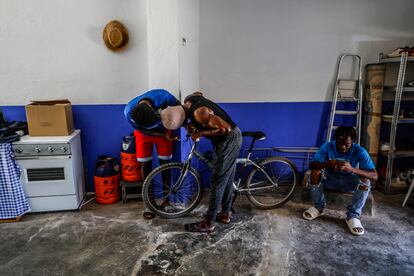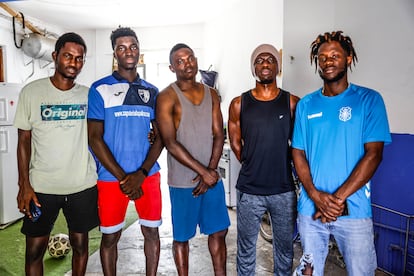On the first day, Emilia Lozano arrived home scratching her head: where is Gambia? What is Cameroon like? Which countries does Guinea-Conakry border on? Since she came to live in the Hortaleza district of Madrid more than 50 years ago, Emilia, 71, had always seen children with problems, entering and leaving the reception centre run by the Community of Madrid in front of her house. But things began to change in 2018, when the neighbourhood began to be frequented by young people from sub-Saharan Africa who barely knew how to speak Spanish. The centre was overflowing and these young people spent entire days in the park talking to each other, walking aimlessly or simply sitting with their gaze lost, without speaking for hours on a sidewalk. Then she began to talk to them: first their name, their country, their family and then where Gambia is, what they eat in Cameroon or what the football teams are in Guinea-Conakry… Anything to get closer to them.
The fact is that she spent more and more time with these boys. “They were 15-year-olds who told terrible stories. One arrived with his feet covered in blisters, others were crying and others were just silent. Most of them had done nothing but suffer since they had left their countries,” she remembers. During those conversations, she learned that many of them had not spoken to their parents again or told them stories different from what they were experiencing. “Everything was going well for them, they had friends and they traveled by car when the reality was that they didn’t even have a clean shirt to wear.” One day in November, she took three of these boys who had never been in a lift up to her house and cooked their favorite meal. The following week, there were already five of them and, a few weeks later, she prepared Christmas dinner for 15 people in the living room of her house, remembers Luis Casillas, her husband.
These kids had breakfast, lunch and dinner every day at the Hortaleza shelter, but this old house run by the Social Services of the Community of Madrid was just a temporary parking lot filled to capacity while the administration looked for a solution for them. “We saw that there was no training there. The kids just hung out, there was no leisure time and the place was very crowded. We also discovered that, the day after they turn 18, they end up on the street without papers and without even knowing Spanish,” explains Emilia.
One day, in front of her door, Emilia met Mohamed, who had just left the centre at the age of 18 years and one day.
―Where are you going to sleep?
“Come here, I’ll show you,” he said, pointing to a space in the bushes of the park.
What matters most is what happens closer to home. To make sure you don’t miss anything, subscribe.
KEEP READING
“No way. You can come home right now,” he replied. “You don’t sleep on the street.”
Since then, that phrase, “you don’t sleep on the street,” is the best summary of his recent life. Finally, Mohamed stayed for 20 days and, together with a dozen neighbors who had joined his initiative, one Epiphany afternoon he decided to found the organization We are Welcome. The organisation currently has 86 members and a borrowed premises where migrants come every day. There, they receive Spanish and computer classes, go to the swimming pool or visit the centre of Madrid without fear of getting lost or having to show their papers to the police over and over again.
Emilia had stopped working a few years ago and Luis, her husband, had just retired. Their three children had left home and the couple only wanted to do the things they had not been able to do until then: travel with the Imserso, enjoy their grandchildren and spend more time in La Puebla de Almoradiel, the town in La Mancha that Emilia had left half a century earlier and to which she only returned at weekends. But their house in Hortaleza was increasingly full and more and more boys were knocking on their door when they turned 18.
On one of those weekends in La Puebla de Almoradiel, Luis told him: “Have you seen how many empty houses there are in the town?”
Emilia’s mind began to stir and a few days later she explained on the town radio what she intended to do. And the response was immediate. The next day, a couple gave her the keys to a 180-square-meter house so that migrants expelled from the juvenile center could live there.
Behind them, a neighbour arrived with a washing machine, another with a bicycle, the carpenter with his tools to repair the kitchen, the bricklayer with cement to tidy up the living room, a painter took care of the living room and two more neighbours appeared with beds and armchairs. Thus, in a few weeks, the idea began to take shape. “People from surrounding villages even started to help,” she recalls about those exciting days in 2021 when she and her neighbours built something resembling a home for those children.

This August afternoon, in the living room of the house, six young people from Ghana, Mali, Senegal, Guinea and two from Gambia are taking shelter from the heat by watching television. One of them is happier than the rest. It is Diaio, 20 years old, who has just found work. At 13 years old he left Guinea, passed through Mali, was mistreated in Algeria and exploited in Morocco until he managed to get on a boat and reach the Canary Islands. After a series of juvenile centres, he ended up in Madrid, where one afternoon he met Emilia. Last month he started working in a company and a few days ago received his first salary. “It is a plasterboard company and I am striving every day to do better,” he explains.
“At the home, everyone arrives without documents and at the NGO we try to arrange their paperwork while they study secondary school, learn a trade or play sports,” explains Emilia. “Afterwards, some stay to work in the village, in the industrial estates or go to Madrid. But they do so with correct Spanish which allows them to make a decen
t living,” she adds. Since it was set up, 37 young people have passed through the centre and Emilia’s face lights up when she talks about them: “One is a plumber, another is a shop manager, another an electrician, two are mechanics…”
Her husband, who also hoped for a quiet retirement travelling with the Imserso, now spends his days in front of the computer chasing impossible papers. He can obtain a criminal record in Guinea-Conakry or the apostille of The Hague ―certificate of authenticity―, which is a certificate of good conduct in Somalia. “Each boy costs us around 800 euros to legalise. In five years we have obtained papers for 20, an effort that is achieved with contributions from partners, friends and acquaintances and a grant from the Government of Castilla-La Mancha of 8,000 euros,” says the couple from Hortaleza.
Every year at this time, they have to do the math and always arrive at the summer with empty pockets. In fact, the house is prepared for eight young people, but today they can only support six because there is no money for more. They survive with “miracles” such as an anonymous businessman who gives them 1,500 euros, a shop in Lavapiés that gives 1,700, a lady who wants to help who donates 600. Recently, the flamenco singer Israel Fernández crossed their paths and organized a charity concert in the town with which they raised 2,000 euros.
On her annual tour, Emilia recalls that she once went to ask the Madrid Government for help, but they told her that the Community does not give subsidies, although they could offer her a course to improve volunteering. She did not expect much money from that request, but she did not expect anything funny either.

Subscribe here to our newsletter about Madrid, published every Tuesday and Friday.
#Emilia #retiree #mobilized #people #migrants